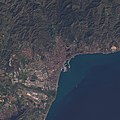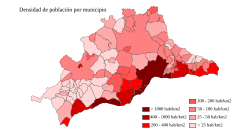Málaga
Malaga (Spanish: Málaga) is a Spanish city in Andalusia, Spain on the Mediterranean coast. The city has 560,000 people. There are more than 1,000,000 people in the surrounding area. It is the second biggest city in Andalusia after Sevilla, and the sixth biggest in Spain. The 20th century artist Pablo Picasso was born in Málaga.
 | |
| Coordinates: 36°43′10″N 4°25′12″W / 36.71944°N 4.42000°WCoordinates: 36°43′10″N 4°25′12″W / 36.71944°N 4.42000°W | |
| Country | |
| Autonomous Community | |
| Province | Málaga |
| Comarca | Málaga-Costa del Sol |
| Founded | 8th century BC[2] |
| Government | |
| • Type | Ayuntamiento |
| • Body | City Council of Málaga |
| • Mayor | Francisco De La Torre Prados (PP) |
| Area | |
| • City | 398 km2 (154 sq mi) |
| • Urban | 827 km2 (319 sq mi) |
| Elevation | 11 m (36 ft) |
| Population (2015) | |
| • City | 569,130[1] |
| • Rank | 6th |
| • Metro | 1,628,973[1] |
| Time zone | UTC+1 (CET) |
| • Summer (DST) | UTC+2 (CEST) |
| Postcode | 29001-29018 |
| Website | www |
Málaga is southernmost large city in Europe, it lies on the Costa del Sol (Coast of the Sun) of the Mediterranean, about 100 km (62.14 mi) east of the Strait of Gibraltar and about 130 km (80.78 mi) north of Africa. Málaga enjoys a subtropical–mediterranean climate. It has one of the warmest winters in Europe, with average temperatures of 17 °C (62.6 °F) during the day and 7–8 °C (45–46 °F) at night in the period from December through February.
Climate
| Weather chart for Málaga | |||||||||||||||||||||||||||||||||||||||||||||||
|---|---|---|---|---|---|---|---|---|---|---|---|---|---|---|---|---|---|---|---|---|---|---|---|---|---|---|---|---|---|---|---|---|---|---|---|---|---|---|---|---|---|---|---|---|---|---|---|
| J | F | M | A | M | J | J | A | S | O | N | D | ||||||||||||||||||||||||||||||||||||
69
17
7
|
60
18
8
|
52
20
10
|
44
21
11
|
20
24
14
|
6
28
18
|
0
31
21
|
6
31
21
|
20
28
19
|
57
24
15
|
101
20
11
|
100
18
9
|
||||||||||||||||||||||||||||||||||||
| temperatures in °C precipitation totals in mm source: Agencia Estatal de Meteorología | |||||||||||||||||||||||||||||||||||||||||||||||
|
Imperial conversion
| |||||||||||||||||||||||||||||||||||||||||||||||
The climate is subtropical-Mediterranean (Köppen climate classification: Csa)[3] with very mild winters and hot summers. Málaga enjoys plenty of sunshine throughout the year, with an average of about 300 days of sunshine and only about 40-45 with precipitation annually. Its coastal location with winds blowing from the Mediterranean Sea make the heat manageable during the summer.[4]
Málaga experiences the warmest winters of any European city with a population over 500,000. The average temperature during the day in the period December through February is 17–18 °C (63–64 °F). During the winter, the Málaga Mountains (Montes de Málaga) block out the cold weather from the north.[4] Generally, the summer season lasts about eight months, from April to November, although in the remaining four months temperatures sometimes surpass 24 °C (75 °F). Its average annual temperature is 23.3 °C (73.9 °F) during the day and 13.7 °C (56.7 °F) at night. In the coldest month, January, the temperature ranges from 13 to 20 °C (55 to 68 °F) during the day, 5 to 13 °C (41 to 55 °F) at night and the average sea temperature is 16–17 °C (61–63 °F). In the warmest month, August, the temperature ranges from 26 to 34 °C (79 to 93 °F) during the day, above 20 °C (68 °F) at night and the average sea temperature is 26 °C (79 °F).
Large fluctuations in temperature are rare. The highest temperature ever recorded at the airport is 44.2 °C (111.6 °F) on 18 July 1978. In the month of August 1881, the average reported daytime maximum temperature was a record 34.8 °C (94.6 °F). The coldest temperature ever recorded was −3.8 °C (25.2 °F) on the night of 4 February 1954.[5] The highest wind speed ever recorded was on 16 July 1980, measuring 119 km/h (73.94 mph). Snowfall is virtually unknown; since the end of the XIX century, Málaga city has only recorded snow one day in the 20th century, on 2 February 1954.[6]
Annual average relative humidity is 65%, ranging from 58% in June to 72% in December.[7] Yearly sunshine hours is between 2,800 and 3,000 per year, from 5–6 hours of sunshine / day in December to average 11 hours of sunshine / day in July.[7][8][9] Rain occurs mainly in winter, with summer being generally dry. Málaga is one of the few cities in Europe which are "green" all year round.
| Climate data for Málaga Airport, Churriana, Spain (1981–2010), Extremes (1942-present) | |||||||||||||
|---|---|---|---|---|---|---|---|---|---|---|---|---|---|
| Month | Jan | Feb | Mar | Apr | May | Jun | Jul | Aug | Sep | Oct | Nov | Dec | Year |
| Record high °C (°F) | 26.8 (80.2) |
30.0 (86) |
31.4 (88.5) |
33.0 (91.4) |
35.0 (95) |
41.0 (105.8) |
44.2 (111.6) |
44.0 (111.2) |
40.0 (104) |
36.3 (97.3) |
30.4 (86.7) |
24.6 (76.3) |
44.2 (111.6) |
| Average high °C (°F) | 16.8 (62.2) |
17.7 (63.9) |
19.6 (67.3) |
21.4 (70.5) |
24.3 (75.7) |
28.1 (82.6) |
30.5 (86.9) |
30.8 (87.4) |
28.2 (82.8) |
24.1 (75.4) |
20.1 (68.2) |
17.5 (63.5) |
23.3 (73.9) |
| Daily mean °C (°F) | 12.1 (53.8) |
12.9 (55.2) |
14.7 (58.5) |
16.3 (61.3) |
19.3 (66.7) |
23.0 (73.4) |
25.5 (77.9) |
26.0 (78.8) |
23.5 (74.3) |
19.5 (67.1) |
15.7 (60.3) |
13.2 (55.8) |
18.5 (65.3) |
| Average low °C (°F) | 7.4 (45.3) |
8.2 (46.8) |
9.8 (49.6) |
11.1 (52) |
14.2 (57.6) |
18.0 (64.4) |
20.5 (68.9) |
21.1 (70) |
18.8 (65.8) |
15.0 (59) |
11.3 (52.3) |
8.9 (48) |
13.7 (56.7) |
| Record low °C (°F) | -2.6 (27.3) |
-3.8 (25.2) |
-1.2 (29.8) |
2.8 (37) |
5.0 (41) |
9.8 (49.6) |
10.0 (50) |
12.2 (54) |
10.2 (50.4) |
5.6 (42.1) |
1.4 (34.5) |
-0.8 (30.6) |
-3.8 (25.2) |
| Precipitation mm (inches) | 69 (2.72) |
60 (2.36) |
52 (2.05) |
44 (1.73) |
20 (0.79) |
6 (0.24) |
0 (0) |
6 (0.24) |
20 (0.79) |
57 (2.24) |
101 (3.98) |
100 (3.94) |
534 (21.02) |
| Avg. precipitation days (≥ 1 mm) | 6 | 5 | 4 | 5 | 3 | 1 | 0 | 1 | 2 | 4 | 6 | 7 | 42 |
| Sunshine hours | 181 | 180 | 222 | 244 | 292 | 329 | 347 | 316 | 255 | 215 | 172 | 160 | 2,905 |
| Source: Agencia Estatal de Meteorología[10] Agencia Estatal de Meteorología[7] | |||||||||||||
| Climate data for Málaga Airport, Churriana, Spain (1981–2010) Highest and lowest mean temperatures | |||||||||||||
|---|---|---|---|---|---|---|---|---|---|---|---|---|---|
| Month | Jan | Feb | Mar | Apr | May | Jun | Jul | Aug | Sep | Oct | Nov | Dec | Year |
| Source: Agencia Estatal de Meteorología[11] | |||||||||||||
| Climate data for Málaga | |||||||||||||
|---|---|---|---|---|---|---|---|---|---|---|---|---|---|
| Month | Jan | Feb | Mar | Apr | May | Jun | Jul | Aug | Sep | Oct | Nov | Dec | Year |
| Average sea temperature °C (°F) | 15.9 (60.7) |
15.6 (60.0) |
15.6 (60.0) |
16.8 (62.2) |
18.4 (65.2) |
21.0 (69.7) |
22.9 (73.2) |
23.5 (74.3) |
21.9 (71.3) |
20.5 (68.8) |
18.1 (64.5) |
16.5 (61.8) |
18.9 (66.0) |
| Mean daily daylight hours | 10.0 | 11.0 | 12.0 | 13.0 | 14.0 | 15.0 | 14.0 | 14.0 | 12.0 | 11.0 | 10.0 | 10.0 | 12.2 |
| Average Ultraviolet index | 2 | 4 | 5 | 7 | 8 | 10 | 10 | 9 | 7 | 5 | 3 | 2 | 6 |
| Source: Weather Atlas [12] | |||||||||||||
Málaga Media
Clay amphora from the Cerro del Villar site, near the mouth of the Guadalhorce (6th century BC).
La malagueña (1919) by Julio Romero de Torres
Málaga in 1572: Castle of Gibralfaro (center)
Population density map of the Province of Málaga.
References
- ↑ 1.0 1.1 "Archived copy" (PDF). Archived from the original (PDF) on 18 April 2016. Retrieved 6 July 2016.
{{cite web}}: CS1 maint: archived copy as title (link) - ↑ María Eugenia Aubet Semmler (2001). The Phoenicians and the West: Politics, Colonies and Trade. Cambridge University Press. ISBN 978-0-521-79543-2.
- ↑ "World Map of Köppen−Geiger Climate Classification". Archived from the original on 6 September 2010.
- ↑ 4.0 4.1 "Málaga City – Local Travel Information and City Guide". Malaga.com. Retrieved 8 April 2011.
- ↑ "Málaga Aeropuerto: Málaga Aeropuerto - Valores extremos absolutos - Selector - Agencia Estatal de Meteorología - AEMET. Gobierno de España". Aemet.es (in español). 1954-02-04. Retrieved 2017-06-23.
- ↑ "La gran nevada de 1954". Archived from the original on 27 August 2013. Retrieved 20 June 2012.
- ↑ 7.0 7.1 7.2 "Valores Climatológicos Normales. Málaga / Aeropuerto".
- ↑ "Climatological Information for Málaga, Spain" Archived 4 March 2016 at the Wayback Machine – Hong Kong Observatory
- ↑ "Málaga Climate, Temperature, Average Weather History, Rainfall/ Precipitation, Sunshine". climatetemp.info. Archived from the original on 16 July 2011. Retrieved 8 April 2011.
- ↑ "Valores extremos. Málaga Aeropuerto". Aemet.es. Retrieved 1 July 2014.
- ↑ "Highest and lowest means. Málaga Aeropuerto". Aemet.es. Retrieved 20 January 2018.
- ↑ "Málaga, Spain - Climate data". Weather Atlas. Retrieved 14 March 2017.
Other websites
| Wikimedia Commons has media related to Lua error in Module:Commons_link at line 62: attempt to index field 'wikibase' (a nil value).. |
- Málaga.diwiki.org Archived 2010-07-06 at the Wayback Machine Periódico digital (in Spanish)










